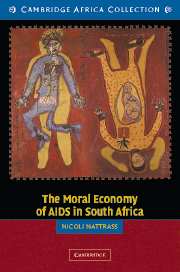Book contents
- Frontmatter
- Contents
- Dedication
- Acknowledgements
- List of abbreviations
- List of figures
- List of tables
- 1 Introduction
- 2 AIDS policy in South Africa
- 3 Mother-to-child transmission prevention in South Africa
- 4 Expanding an AIDS intervention to include HAART for all who need it
- 5 AIDS, HAART and behaviour change
- 6 AIDS, economic growth and inequality in South Africa
- 7 Conclusion
- Notes
- References
- Index
7 - Conclusion
Published online by Cambridge University Press: 06 July 2010
- Frontmatter
- Contents
- Dedication
- Acknowledgements
- List of abbreviations
- List of figures
- List of tables
- 1 Introduction
- 2 AIDS policy in South Africa
- 3 Mother-to-child transmission prevention in South Africa
- 4 Expanding an AIDS intervention to include HAART for all who need it
- 5 AIDS, HAART and behaviour change
- 6 AIDS, economic growth and inequality in South Africa
- 7 Conclusion
- Notes
- References
- Index
Summary
In the late 1990s, when aids activists and medical practitioners first started demanding a national mtctp programme, the government said it was ‘unaffordable’. This discourse remained hegemonic even after studies were published (and presented in the form of affidavits) showing that the health sector would almost certainly save money by implementing such a programme. It was only after being ordered to do so by the Constitutional Court in 2002, that the government started rolling out mtctp. The discourse of unaffordability was also used to justify the government's initial refusal to provide haart through the public sector. But as it became clear during the course of 2003 that public pressure and political expediency were making this inevitable, government discourse shifted in subtle ways. Rather than arguing that haart was simply unaffordable, the government highlighted the complexities of aids treatment, and the need for effective and ‘sustainable’ interventions. A sustainable programme, which by definition grows in line with available resources, is obviously desirable. The key question which is being begged through the use of this term, however, is the level of resource commitment from the government.
haart is very expensive, and although there are significant savings to the health budget (relating to lower aids-related morbidity and mortality), these are unlikely to outweigh the direct costs of a national haart intervention. As shown in Chapter 4, expanding an aids intervention to include the provision of haart for all those who need it will have substantial benefits in terms of fewer orphans, fewer new hiv infections and longer life-expectancy.
- Type
- Chapter
- Information
- The Moral Economy of AIDS in South Africa , pp. 178 - 189Publisher: Cambridge University PressPrint publication year: 2003



